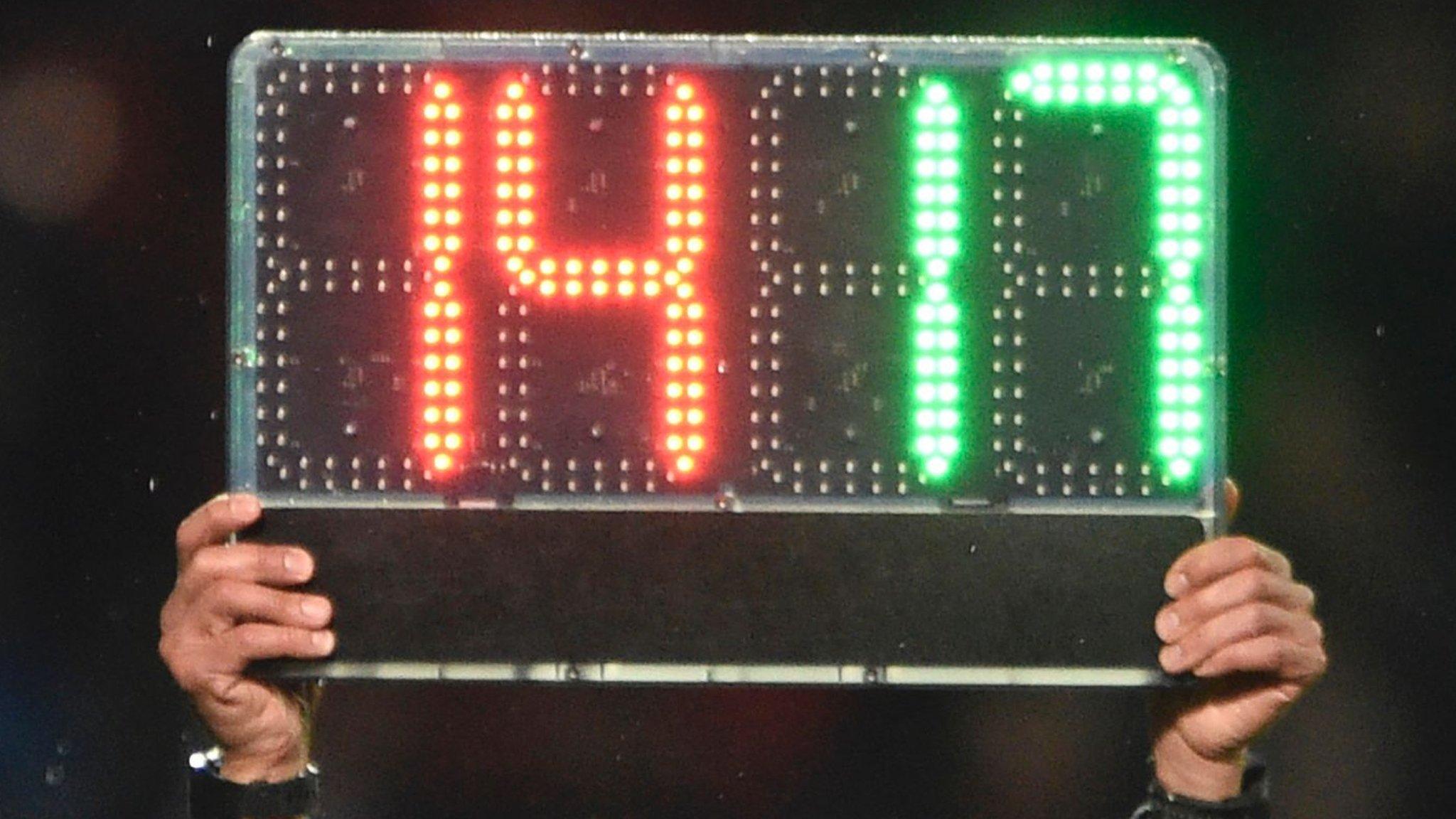Women's Euro 2017: All you need to know about the tournament in the Netherlands
- Published
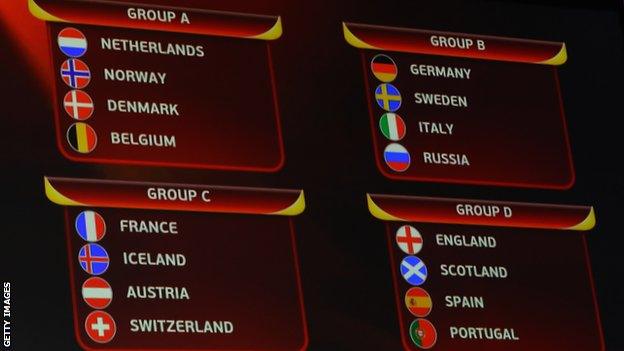
England and Scotland will meet in their opening game on Wednesday, 19 July
Uefa Women's Euro 2017 |
|---|
When: 16 July-6 August Where: The Netherlands BBC Coverage: Selected live commentaries on BBC Radio 5 live, Scotland games on Radio Scotland and online, plus live text coverage on the BBC Sport website. |
With more teams, more prize money and more substitutions than ever, Euro 2017 will be the largest Women's European Championship yet.
England and Scotland are among the 16 teams who will compete in the Netherlands, with the tournament starting on Sunday and sell-out crowds expected.
The competition comes around once every four years, and Germany are the holders following their 2013 triumph in Sweden.
BBC Sport looks at the key things you need to know.
A three-week football festival
The Women's Euros have expanded to include 16 teams, with the top two teams from each group of four progressing to the quarter-finals.
The competition gets under way when the Netherlands meet 2013 finalists Norway in Group A after the opening ceremony.
The group stage concludes on 27 July, before the quarter-finals on 29-30 July, the semi-finals on 3 August and the final on 6 August.
England and Scotland are in the same group, alongside Spain and Portugal.
England's Group D fixtures: Scotland (19 July), Spain (23 July), Portugal (27 July).
Scotland Group D fixtures: England (19 July), Portugal (23 July), Spain (27 July).
There will be two matches on each day of the group stage, with one at 17:00 BST and another at 19:45 BST.
What are the venues?
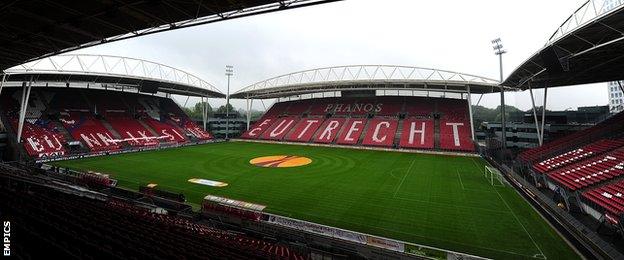
Utrecht's Stadion Galgenwaard will host the opening game, plus England v Scotland
A total of 31 matches will be played at seven different venues in the Netherlands, which is hosting the competition for the first time.
Utrecht will host England v Scotland on 19 July, as well as three other group games.
Deventer, Doetinchem, Rotterdam and Tilburg will all stage group matches, plus a quarter-final each.
Breda, which will also host four group games, and Enschede are the venues for the semi-finals, with FC Twente's 30,000-capacity stadium in Enschede the venue for the final.
The favourites - can anyone stop Germany?
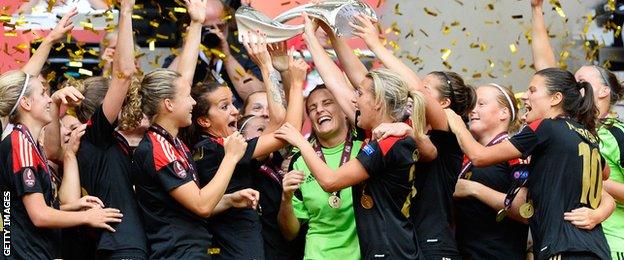
Germany beat Norway 1-0 in the 2013 final in front of a tournament record crowd of 41,301
Germany have dominated the European Championship for decades.
They have won it six times in a row, stretching back to 1995, and also arrive as the Olympic champions.
However, they are expected to face tough competition from France, who have not won a major tournament but triumphed in the SheBelieves Cup in March, drawing with Germany and beating world champions the United States 3-0.
At club level, French women's football has enjoyed rich success in Europe in recent years, with Lyon winning their second consecutive Women's Champions League title in Cardiff in June - and the national team is targeting European glory too.
"Germany's record is unparalleled, but their current team is relatively unknown," former England goalkeeper Rachel Brown-Finnis, now a pundit, told the BBC World Service.
"They were a brick wall before and - psychologically - you felt like you were beaten before you kicked a ball. But a lot of their big names have retired.
"So they have seen wholesale changes, but you can never write them off at all and they're probably still the favourites, even if their squad is on a bit of a journey.
"France are probably the most in-form team. They are so gifted and talented, and that group of players have been playing together for quite a long time."
'This could be the one' for England
England more talented than ever - Sampson
Also tipped for a strong tournament are England, who want to improve on their impressive third place at the 2015 World Cup.
The Lionesses were unbeaten during qualifying for the Euros, winning seven of their eight matches, and conceded only one goal in the process.
Manager Mark Sampson named his squad more than three months before the tournament, and his side have performed well during their warm-up fixtures, beating fellow qualifiers Austria, Switzerland and Denmark.
"I do think England are very, very strong," Brown-Finnis added. "They've got young, up-and-coming players.
"This could be the one, getting them over the line for gold. France are the only team England have not beaten in this modern era of women's football.
"The reasons Mark Sampson gave for naming a squad early were justified. I've learnt to trust Mark and his methods.
"There will be a number of players who I expect to announce their retirement after this European Championship, so for them, this is a last opportunity."
Who else is in contention?
Europe's highest-placed sides in the Fifa world rankings | |
|---|---|
2nd: Germany | 3rd: France |
5th: England | 9th: Sweden |
11th: Norway | 12th: The Netherlands |
13th: Spain | 15th: Denmark |
After their silver medal at Rio 2016, Sweden should not be underestimated.
Spain also have a talented squad, and four years ago they stunned England with a 3-2 win in the group stages of the Euros.
Norway, runners-up in 2013, have reached two of the past three finals and - as two-time winners - are the only country other than Germany, or West Germany, to have won the competition since 1984.
The Norwegian side includes 2017 BBC Women's Footballer of the Year Ada Hegerberg, who helped club side Lyon win another treble this term.
Hosts the Netherlands, meanwhile, have six players from English Women's Super League clubs.
Leading the attack for the Oranje will be new Arsenal Ladies striker Vivianne Miedema, who scored 14 goals in 22 Bundesliga games for Bayern Munich in 2016-17.
They will be backed by lively home crowds, with all three of their group-stage games having sold out well before their opener against Norway on Sunday.
Scotland in a major tournament at last
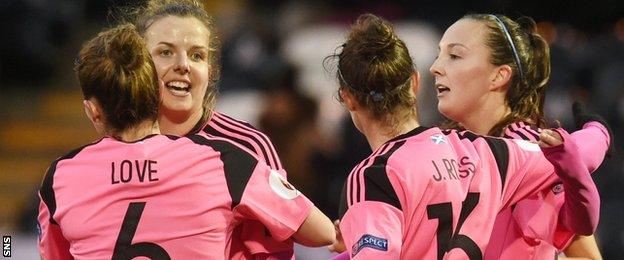
Tournament debutants Scotland are 21st in the Fifa women's world rankings
Scotland Women have qualified for their first major championship at the 14th attempt.
Led by coach Anna Signeul, who will leave her role following the Euros after 12 years in charge, the Scots qualified as runners-up to Iceland thanks to wins - home and away - over Slovenia, Belarus and Macedonia.
But injuries have robbed them of some of their key players, including Arsenal playmaker Kim Little and Manchester City centre-back Jen Beattie.
The Scottish Football Association and women's national team had been involved in a dispute over financial, commercial and equality matters, but the issue was resolved in June.
The players had refused to take part in media or promotional work, but once resolved, hailed the agreement as a "historic moment" towards "achieving equality".
More money at stake
The total prize money for the tournament is 8m euros (£7m) - nearly four times more than the 2.2m euros (£1.9m) available in 2013. The tournament winners will earn 1.2m euros (£1m).
Each of the 24 nations at last year's men's Euro 2016 received 8m euros for participating, while champions Portugal won 27m euros (£23.7m).
Uefa only introduced prize money for all the finalists of the women's Euros as recently as the 2009 tournament., external
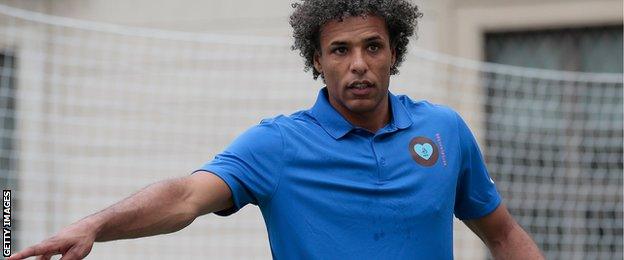
Former Celtic, Nottingham Forest and Netherlands striker Pierre van Hooijdonk is the ambassador for Euro 2017
Uefa continues two rule-change trials
Teams will be allowed to make a fourth substitution during extra time of matches, as Uefa continues a trial of the rule.
European football's governing body has already trialled the change at the men's European Under-21 Championship and both the men's and women's under-19 tournaments.
Additionally, referees will have the power to show yellow and red cards to non-playing staff in the technical area.
Rachel Brown-Finnis was speaking on the BBC World Service's Euro 2017 preview show, which is available as a podcast here.
- Published14 July 2017
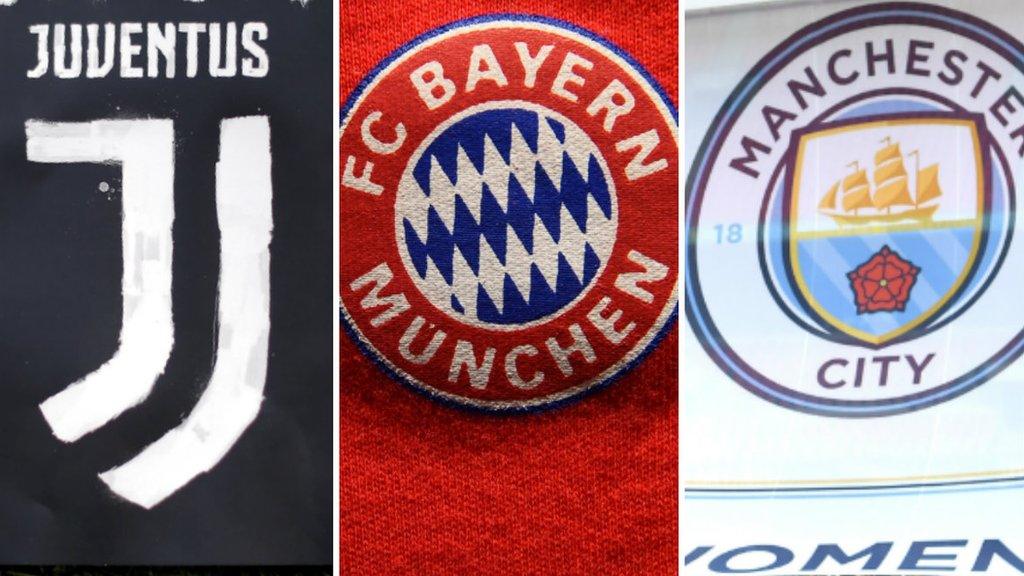
- Published14 July 2017
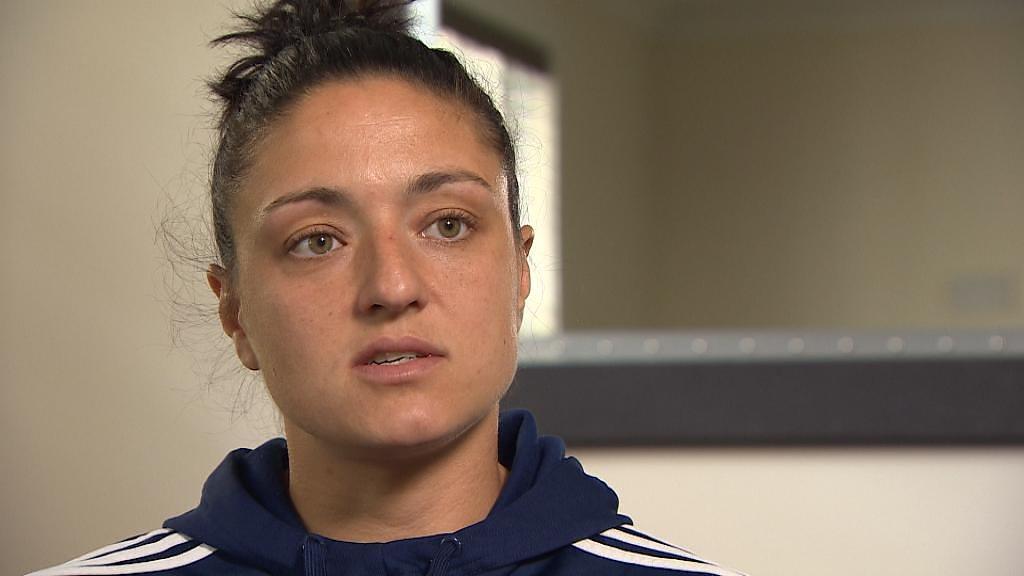
- Published1 June 2017
